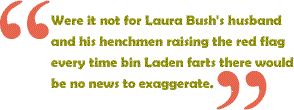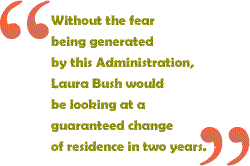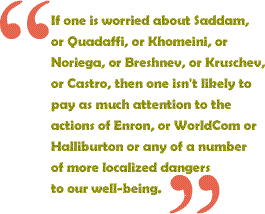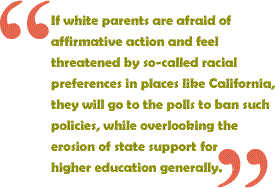Laura
Bush wants everyone to just relax; and more to the point, she wants
the media to aid  in
the process of nerve-calming by restraining themselves from what
she sees as a growing tendency to scare the public with stories
of impending cataclysm.
in
the process of nerve-calming by restraining themselves from what
she sees as a growing tendency to scare the public with stories
of impending cataclysm.
From repetitive coverage of the "orange alert"
announced by Homeland Security Director Tom Ridge, to the airing
of extended sections of Osama bin Laden's latest anti-love letter,
the First Lady worries that the children might become overanxious.
After all, it's difficult to explain to nine-year olds why their
parents are running around the house, covering doors with plastic
and sealing off windows with duct tape.
As Lady Bush explained to an audience in New York
recently, "it's a bit like crying wolf...you know it hasn't
happened yet."
Quite so, though such a statement begs the obvious
if impolite question: namely, who does she think has been feeding
information to the press in the first place? Who said we have to
launch a "preventative war" with Iraq because to wait
might result in "mushroom clouds" over America?
Simply put, were it not for Laura Bush's husband
and his henchmen raising the red flag every time bin Laden farts
there would be no news to exaggerate. 24-hour news cycles are a
lot easier to fill when you're getting faxes every half-hour from
the Pentagon proclaiming "new evidence" of Saddam Hussein's
bad faith, provided by sources you can't name, but that the American
public should nonetheless trust, or so we're told.
Perhaps the First Maven of literacy - who has apparently
forgotten the maxim that "charity begins at home" - should
worry less about the media and a bit more about an Office of  Homeland
Security that puts out warnings based on tips from folks who weren't
even given a polygraph for two weeks, and when they were, failed
it. And just how much is this cracker-jack unit costing us again?
Homeland
Security that puts out warnings based on tips from folks who weren't
even given a polygraph for two weeks, and when they were, failed
it. And just how much is this cracker-jack unit costing us again?
Fear isn't something created by the media, so much
as by the political leaders they cover. It is politicians whose
stock in trade is conjuring up insecurity among the public; after
all, what better way to convince them to support civil liberties
restrictions like those in the Patriot Act; what better way to convince
them to support a war that might kill - according to UN estimates
- a half-million Iraqis? Most Americans are decent people who don't
relish the thought of such bloodshed. But if told that it's "them
or us," even the most magnanimous soul can be turned into a
reactionary automaton who will countenance mass murder.
Fear is functional. It serves the interests not
only of the media, which can pull larger ratings in the face of
crisis, but also the interests of elected officials who need public
panic to justify their policies. Indeed, without the fear being
generated by this Administration, Laura Bush would be looking at
a guaranteed change of residence in two years, seeing as how the
economy is in the crapper and her hubby's plan to rescue it can't
even get the support of a conservative economist like Alan Greenspan.
Far from criticizing media scare coverage, she should be welcoming
it as the only thing keeping her from those hot Texas summers on
the Crawford Ranch.
Fear always serves the interests of elites. Throughout history they
have sought to identify dangers from which they insist their subjects
must be protected: witches, Jewish financiers, Papists, freemasons,
Indians, immigrants, atheists, communists, drug dealers, rebellious
slaves, the Mafia, the Black Panthers, jazz, rock and roll and now
rap music, the "homosexual lifestyle," satanic ritual
abuse, day care operators who molest children, and now Muslim terrorists.
 And
in each case, the generation of fear and insecurity does at least
two things.
And
in each case, the generation of fear and insecurity does at least
two things.
First, it enhances the power of elites by convincing
the people to keep them in office. After all, candidates rarely
tell the voters all the positive things they hope to do; rather,
they focus on how they intend to "protect us" from crime,
the "death tax," their opponents who seek to raid the
social security trust fund, the scourge of drugs, or madmen like
Saddam Hussein.
Fear sells, and it gets people elected.
Secondly, fear sows mistrust in the population,
which reduces the people's ability to come together for constructive
social change; it hampers solidarity in other words. If the public
is being encouraged to wonder if their neighbors are commies, sex
offenders, sniper wanna-be's or members of an al-Qaeda sleeper cell,
then what's the likelihood that they'll seek to forge relationships
with others, especially strangers? And what will the lack of community
cohesion mean in terms of the public's ability to confront serious
social problems, from crumbling schools, to environmental pollution,
to inadequate health care?
When whites flee the cities for "nice, safe"
places in the 'burbs, because they've been convinced that their
lives are endangered not from other white folks like their bomb-building,
drunk driving kids, but rather by black and brown folks in the 'hood,
what are the chances of whites and blacks getting together to deal
with their often common economic interests?
Historically we have seen this dozens of times.
Consider those labor unions that perpetuated racism and were encouraged
to do so by employers who used people of color to break the strikes
of white workers. By sowing suspicion of the "outsiders,"
elites could divide people with common interests, prevent them from
acting in solidarity, and boost their own position as a result.
Likewise, slave owners in the South, who convinced
poor whites to fight and perhaps die in a war that, by their own
admission, was about protecting the property interests of the elite.
And how did they do it? By scaring the masses about what would happen
if blacks were free: they would take white jobs, rape white women,
and overturn "our way of life."
Or during the Cold War, during which time we were
told that we had to stop the Soviets frommaking inroads into "our
backyard" by invading such imminent threats as Grenada. The
perceived threat of communism was used to boost the careers of political
elites and justify massive military spending, which in turn was
good for economic elites.
In short, fear and insecurity increases the power of the state,
encouraging us to trust so-called experts, who we're told have the
specialized knowledge to protect us from the myriad dangers out
there. They encourage us to mistrust our own judgment, suspect others
of wrongdoing, and become less involved in political life.
 When
one is afraid, after all, one tends to withdraw, become overwhelmed,
and look for safety in the quickest manner possible, which in this
case means trusting others who promise to make us safe, even if
it means relinquishing certain freedoms and moving further to the
authoritarian right of the political spectrum. A population is best
controlled when it's afraid.
When
one is afraid, after all, one tends to withdraw, become overwhelmed,
and look for safety in the quickest manner possible, which in this
case means trusting others who promise to make us safe, even if
it means relinquishing certain freedoms and moving further to the
authoritarian right of the political spectrum. A population is best
controlled when it's afraid.
Not only controlled, but diverted. If one is worried about Saddam,
or Quadaffi, or Khomeini, or Noriega, or Breshnev, or Kruschev,
or Castro, then one isn't likely to pay as much attention to the
actions of Enron, or WorldCom or Halliburton or any of a number
of more localized dangers to our well-being. Suddenly, forty million
people without health care or in poverty are off the front page,
and rising unemployment becomes a footnote.
If the public is afraid of becoming another homicide statistic -
and indeed about 15,000 people are murdered annually - then they
won't likely notice the 60,000 or more who die every year because
of workplace illness, disease or accidents that could have been
prevented had corporations not cut corners on workplace safety standards
or environmental protection.
If white parents are afraid of affirmative action and feel threatened
by so-called racial preferences in places like California, they
will go to the polls to ban such policies, while overlooking the
erosion of state support for higher education generally, and the
fact that in the last twenty years California only built one new
four-year campus, while they built more than twenty prisons.
Had the ratio been reversed, all college-eligible kids in the state
would have had a good school to attend and affirmative action would
have been largely irrelevant. But rather than take action on that
simple truth, they turned on their neighbors and fought over the
scraps of a pie that none of them owned to begin with.
With the fear of terrorism and Saddam, the gambit
is working. Every place I travel I see letters in local papers calling
on Americans to "give up some freedoms," for the sake
of security: more camera surveillance, e-mail snooping, infiltration
of organizations and mosques, or closing the borders and deporting
immigrants.
I hear folks on talk radio saying we should go to war, even if the
purpose is to maintain dominance over oil, since "our way of
life" depends on the substance. Ironically, these admonitions
are often followed by claims that the letter-writer or caller "refuses
to live in fear," because doing so would allow the terrorists
to win. This, despite the fact that fear is exactly the condition
under which they live, perpetually it seems. It is the fuel that
fires their votes, consumer purchases, travel decisions - all of
it.
And to help throw more fuel on that fire, we now have a CIA report
that claims the odds of Saddam launching an attack on the U.S. with
weapons of mass destruction are 59% before the end of March, and
that there is only a 6% chance that he will never use such weapons
against us. Of course the media reported this announcement, despite
the fact that it has all the methodological soundness of a Tarot
reading by Miss Clio.
But is the panic generated by such a "revelation" the
fault of George Stephanopolous, who asked Tom Ridge about it on
national TV, or is it the fault of the CIA itself, which puts out
prognostications made up of whole cloth, knowing full well that
much of the public will buy what it's selling? The answers are self-evident.
At the end of the day, when Laura Bush blames the media for stoking
public anxiety, I would guess that there is a 91.3% chance that
the Lady doth protest too much, and only an 8.7% chance that she
really believes what she's saying. After all, it is 100% certain
that fear is what pays her house note.
Tim Wise is an essayist, antiracism activist and lecturer. He
can be reached at [email protected]

www.blackcommentator.com
Your
comments are welcome. Visit the Contact
Us page for E-mail or Feedback.
Click
here to return to the home page

